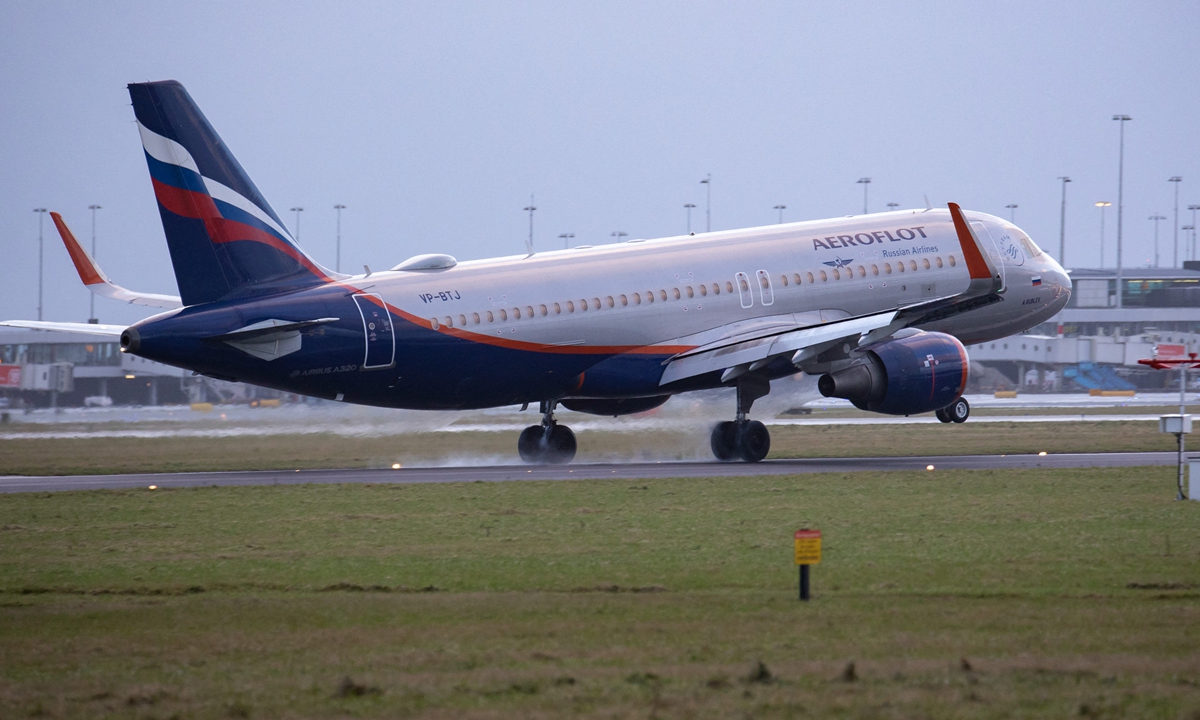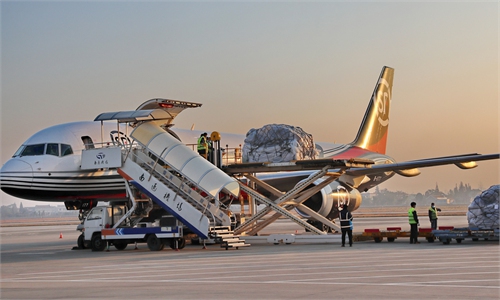Chinese airlines face no direct impact from Western bans on Russian flights
Closed skies

An airplane of Russian carrier Aeroflot is seen landing on the runway at Amsterdam Schiphol Airport on January 5, 2022. Photo: AFP
US President Joe Biden announced a ban on all Russian aircraft from American airspace during his State of the Union speech on Tuesday evening, following similar moves by the European Union and Canada, amid the widening sanctions targeting Russia over the conflict in Ukraine.
While the joint sanctions by both the US and EU over Russia and Moscow's countermeasures will bring about a foreseeable impact to European aircraft to and from Asia, given the extra distance and costs for detours, the actual disruption to Asian airlines is expected to be limited, and may even boost businesses in terms of filling up the supply gap left by banned aircrafts, industry analysts said.
"We will join our allies in closing off American airspace to all Russian flights, further isolating Russia and adding an additional squeeze on their economy," Biden said in his first State of the Union address on Tuesday.
Following Biden's announcement Tuesday evening, the US Federal Aviation Administration (FAA) said in a statement that the official notice banning Russian aircraft from US airspace would be posted by Wednesday. This includes scheduled passenger flights as well as cargo and charter flights.
The order will "suspend operations of all aircraft owned, certified, operated, registered, chartered, leased, or controlled by, for, or for the benefit of, a person who is a citizen of Russia," the FAA said, according to media reports.
The US' joining of Canada and the EU in closing off its airspace to Russian aircraft will not have direct impact on Chinese airlines, aviation experts said.
Compared with the impact on European airlines following Russia's retaliatory move banning the former, US' airlines will face only mild disruptions if Russia takes countermeasures.
"Normal air travel routes between China and the US face limited affect since there is a very short flying range within the Russia airspace. For Chinese carriers, there is no direct impact, while for US carriers along the routes, if they are banned by Russia, they need to detour, but it won't take long, maybe only one or two hours," Lin Zhijie, a market watcher, told the Global Times on Wednesday.
"For the US airlines, they may face increased carbon emissions and higher fuel costs, but flights will still be completed," Lin added.
As more foreign airlines are being restricted, international air transportation between Europe and Asia as well as America and Asia will be under more pressure both on the transportation of passengers and air cargo, according to Lin.
Banning European planes flying over Russia will prompt these airlines to find alternative routes to Asia, in which case, airlines in Asia and the Middle East are expected to see their traffic and profitability receive a boost, he added.
EU routes more difficult
Routes between Europe and destinations in East Asia such as China, Japan, and South Korea will become the most difficult following Russia's flight ban both in passenger flow and freight cargo, analyst said.
Airlines from 36 countries are banned from using Russian airspace as of February 28 after the EU, the UK and Canada all announced bans on Russian aircraft.
In response to the sanctions, the Federal Air Transport Agency of Russia announced the retaliatory measures banning aircraft from those countries.
The bans are expected to hurt airlines that fly over Russia on routes between Europe and Asia.
Sources from industry information provider VariFlight told the Global Times on Tuesday that on February 28, 62 international flights flew through Chinese airspace. Among them, foreign airlines on domestic-European routes bypassed Russian airspace, and the number of actual flights was reduced to 3, namely OS76, DE2366, and AF128.
Chinese flights to and from Europe were still flying normally, and no detours were required, VariFlight confirmed on Tuesday.
Compared with seven days before the mutual sanctions were implemented between Russia and the EU, 97 international flights entered Chinese airspace, including 12 foreign airlines travelling between China and Europe.
The tit-for-tat airspace bans concerning multiple countries have sparked flight cancellations and costly detours, shedding shadow to the aviation industry that has been hurt hard by the ongoing COVID-19 pandemic.
Global airline passenger capacity rose 9 percent on a yearly basis in 2021 but was still 35 percent below the pre-pandemic level in 2019, with passenger volume plunging to the lowest since 2009-2010, according to flight and data analytics firm OAG.
"Many routes of European airlines cannot be detoured and can only be cancelled. If they fly around, such as passing through the Middle East, there is no operational advantage compared to local airlines," Qi Qi, an industry analyst, told the Global Times on Wednesday.
"For airlines in China, Japan and South Korea, they have not been affected, so routes will not be interrupted, but flights will be reduced. In general, passenger flights from East Asia to Europe will face a certain impact, with supply chains also facing greater pressure," Lin said.
Freight is key to the stability of global supply chains. There are not many all-cargo aircraft in China, and many European all-cargo aircraft come to China for transportation, according to Qi.
"Although detours are possible, the cost will increase and it will also have an impact on the air freight prices," Qi added.



